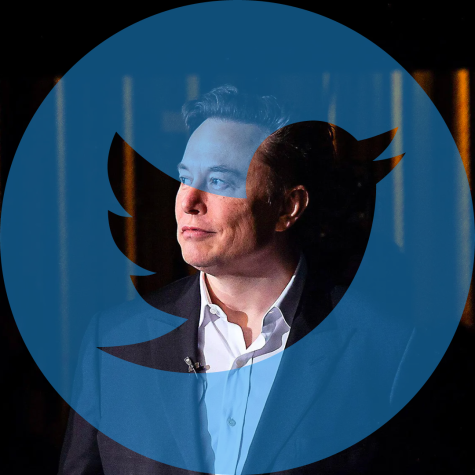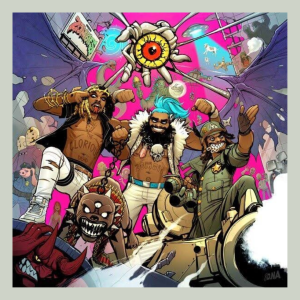Musk, Moderator-in-chief
November 17, 2022
 The issue of an individual’s right to free speech on social media platforms has resurfaced in the public discourse lately. The re-emergence of this topic, which has been fiercely debated since social media emerged as a prominent medium of public discourse, comes as a result of eccentric billionaire Elon Musk’s decision to purchase Twitter.
The issue of an individual’s right to free speech on social media platforms has resurfaced in the public discourse lately. The re-emergence of this topic, which has been fiercely debated since social media emerged as a prominent medium of public discourse, comes as a result of eccentric billionaire Elon Musk’s decision to purchase Twitter.
The deal, which was finalized late last month, allowed Musk to acquire control of the large social media platform for $44 billion dollars. The powerful and ambitious CEO plans to make significant changes to the platform, including implementing paid verification, allowing creators to monetize content easily and turning it into a “super-app”.
Musk’s acquisition of Twitter has created a surplus of controversy both within the company, and among users of this wildly popular platform. Upon the finalization of his purchase of the company, Musk liquidated many people in important administrative roles at Twitter whom he has publicly criticized. Among those fired included the former CEO, general counsel and policy chief of the company.
Musk, a self-proclaimed free speech absolutist, has entertained the idea of bringing several controversial political and social figures back into the twitter-sphere. This notion comes much to the chagrin of many activists and activist organizations who have successfully managed to de-platform people like Donald Trump, Mike Lindell and Marjorie Taylor Greene from the app.
In statements made to the Washington Post, Musk has indicated that he plans to create rules around de-platforming users that align with the laws pertaining to free speech in the respective country that Twitter is operating in. Meaning that unless an individual’s input into the application violates the law in their home country, their account will not be taken down.
Musk’s plan for the future of censorship on Twitter has generated ample concern from those who remain opposed and critical of the tech billionaire. Citing that this approach is overly simplistic and will propagate increased misuse of the site, the presence of mob and hate violence, and an enhanced ability of oppressive governments abroad to control and eliminate the presence of dissenting political speech on the platform.
Pratik Sinha, the founder of Alt News, an Indian nonprofit fact-checking website, fears that Musk’s policy would allow the right leaning government in India to keep valid points of political contention from the left in the country, off of the app.
“Billionaires like Musk and [Facebook’s Mark] Zuckerberg, who live in an extremely privileged bubble, clearly do not understand how governments work in countries that are not First World,” Sinha said.
Support for Musk’s planned changes to censorship regulations on Twitter comes largely from those who believe that de-platforming important figures on Twitter have been used for political gain, in order to shift the narrative of public discourse away from the conservatives in America.
Musk himself believes this, tweeting “I’m worried about de facto bias in ‘the Twitter algorithm’ having a major effect on public discourse,”.
The evolution of social media into the primary place of public discourse contemporarily adds multiple layers of complexity to the decision and permission of those within these companies to decide whom to ban and not ban. People have many different ideas about regulating the conversation on these applications as well as what institution gets to decide to de-platform users.
Adam Lamparello, a criminal justice professor, believes that the companies that design and maintain these online platforms such as Twitter, should have free speech laws around discourse on their app that are aligned with the protections and restrictions on free speech in America that exist in the 1st amendment of the Constitution.
Lamparello feels that these companies should not be allowed to implement additional restrictions or guidelines beyond those outlined in the legal proceedings concerning free speech in the US, largely as a result of their frequent collaboration with the US government that makes them an extension of it.
“In my view, social media is the new public forum for 1st amendment purposes,” Lamparello said. “Contemporary political discourse is no longer happening on main street or in a public park. Given that, and social media companies effectively being government actors as a result of their collaboration with the government on multiple occasions, especially in their restriction of dialogue pertaining to certain aspects of the COVID-19 crisis. They should only be allowed to restrict and control free speech to the extent that the government is allowed to.”
Lamparello believes that by doing this, a robust and eclectic public dialogue could be restored that would effectively foster the operation of a more effective democracy with a more well-informed citizenry. He feels this would allow the expression of alternative points of view that could potentially enrich citizens’ understanding of complex political and social problems our country is facing.
“I am disappointed with the current state of discourse in this country,” Lamparello said. “I feel that Musk’s policy will ensure we truly have a public forum that is welcome to all views. His management of the platform is much more in line with what the framers intended for the public sphere to look like and is aligned with the creation of a more informed citizenry that is crucial to democracy.”
Anonymous sophomore and MIS major concurs with Lamparello on the issue of speech restriction, believing it to be only warranted when someone is advocating something that is illegal.
“Whether we like it or not, these social media platforms are a massive part of modern political and social discourse, and the restriction of a person’s ability to use them has the potential to be used to silence dissenting opinions,” Anonymous said. “If it were up to me, the only bans would target those who use social media sites to facilitate real-world action that is both illegal and almost universally seen as immoral.”
Sam Dober, a senior political science major, also believes that the 1st amendment and speech on social media platforms are importantly connected, and must be protected similarly.
“The use of Twitter is indistinguishably linked to free speech as it is a necessary tool used by people in the modern internet age,” Dober said. “Therefore it is linked to our 1st amendment right and hence bans should only occur to individuals that threaten harm on others through their language.”
Musk’s acquisition of Twitter has brought on controversy and disagreement from many different people. The public remains to see how his shifting policy concerning discourse will impact the utility and functionality of the platform as we get further into his stint as CEO.




